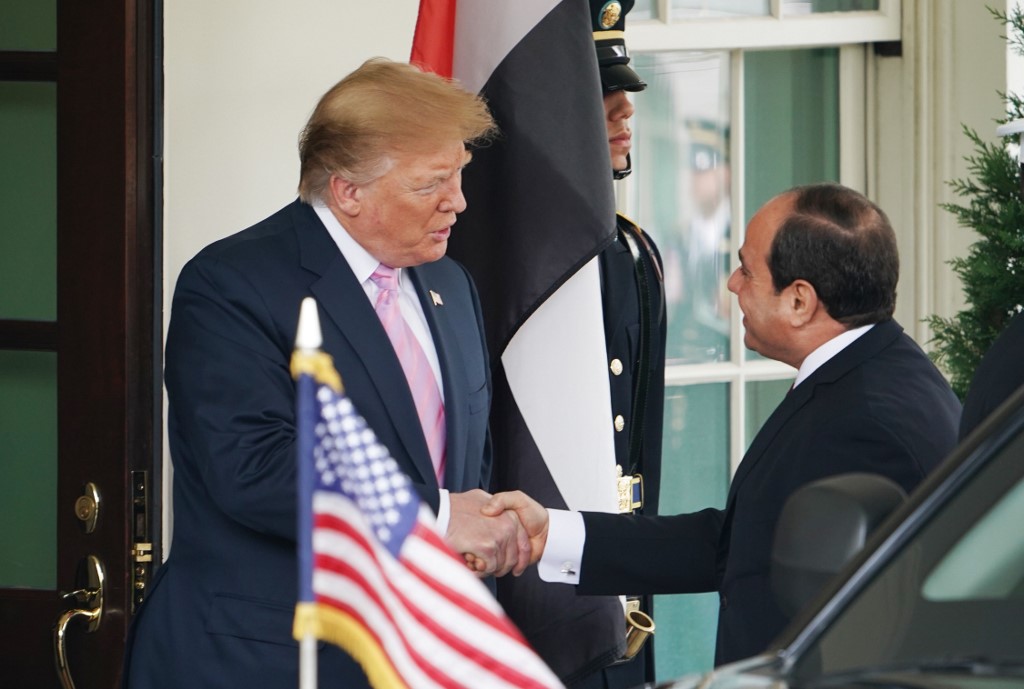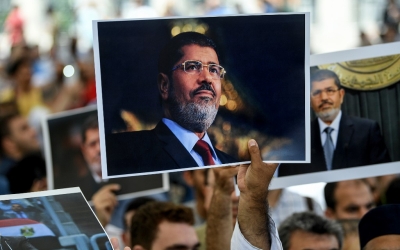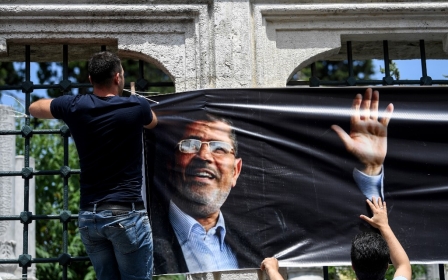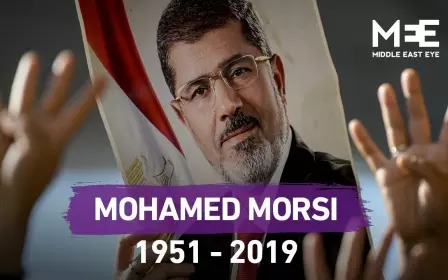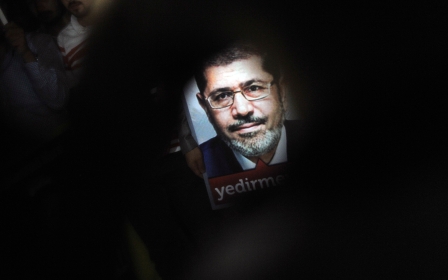Mohamed Morsi’s death and the West's hypocrisy
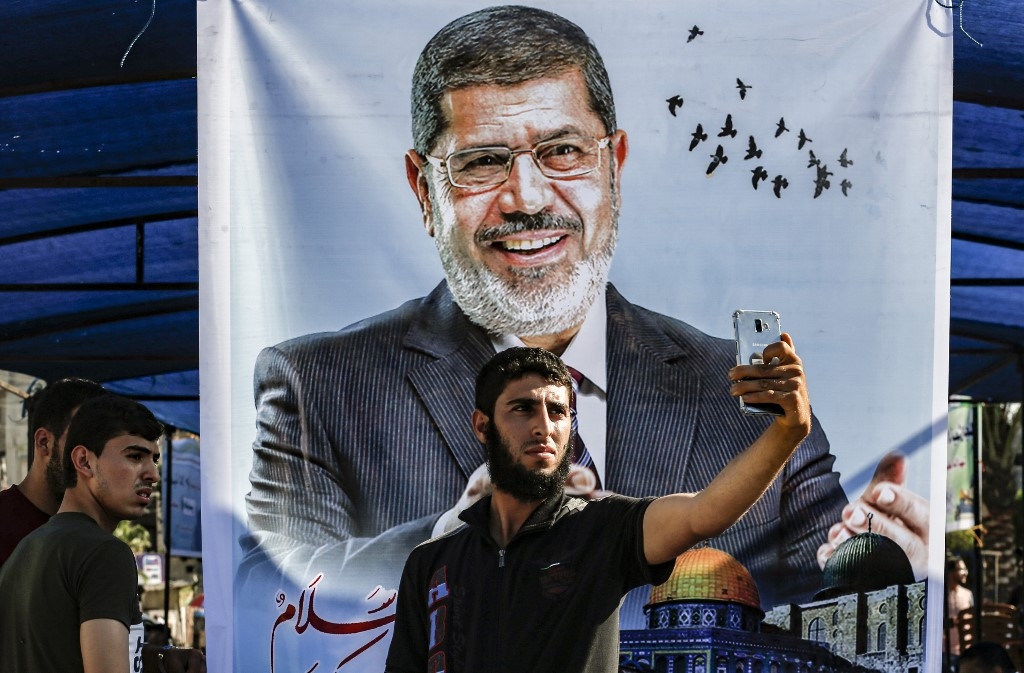
The most dramatic lesson to be imparted from Egyptian president Mohamed Morsi’s recent death is that if democratisation of the Arab world is to take place, it will have to be accomplished against Western governments as well.
Despite the deafening and telling silence from Western governments, the murder of the first and only democratically elected civilian president of Egypt - because it was a murder, slow but methodical and deliberate - is a major world event, not the minor historical footnote many would like it to be.
The debate has already started about what his legacy should be, with some claiming ominously that “Morsi will be remembered, tragically, for the message that was delivered by Arab despots in the aftermath of his electoral victory - that democracy and freedom will not be tolerated”. Others remain more optimistic, predicting that his tragic death will give Morsi “a status in death that he never achieved in life”.
Regardless, there are several lessons we can take away.
Islamists can be democratic
New MEE newsletter: Jerusalem Dispatch
Sign up to get the latest insights and analysis on Israel-Palestine, alongside Turkey Unpacked and other MEE newsletters
Contrary to the false belief that has reigned supreme in the West for decades, by which “Islamists” have been lumped together with jihadists as a threat to “Western civilisation”, certain “Islamist” strands, including the Egyptian Muslim Brotherhood, have often proved to be a force of democratisation.
At the same time, anti-Islamist “secularists” or “progressives” supported the July 2013 fascist coup of General Abdel Fattah al-Sisi that deposed Morsi.
'Islamism' lumps together movements as dramatically different and fundamentally incompatible ... as Tunisia's Ennahda and the Islamic State
Egypt’s Tamarod protest movement, after siding with Sisi in the toppling of Morsi, sought to foment a second coup in Tunisia, which fortunately failed. Still, paranoid Western cultures and their political-media castes present a false dichotomy between the “safe”, “moderate”, Westernised Muslims, versus the conservative, villainous “Islamists”.
“Islamism” lumps together movements as dramatically different and fundamentally incompatible - both theologically and politically - as Tunisia’s Ennahda and the Islamic State. Since 2011, Egypt has shown that reality can be the exact opposite of this crude, binary presentation.
Morsi's legacy
Despite Morsi’s failings, he was part of a significant democratic transition in Egypt - incomparably better than the fascist, totalitarian, despotic, murderous, Western-backed regime that replaced him.
Shadi Hamid and Meredith Wheeler, two researchers specialised in political Islam, demonstrated objectively in their important 2014 article for The Atlantic that even the short, one-year Morsi Presidency corresponded to and was part of a significant democratic transition of Egypt.
Using the Polity IV Index, one of the most widely used empirical tools for measuring autocracy and democracy, Hamid and Wheeler demonstrate that in democratic terms, though evidently not perfect especially given the truly impossible circumstances of Egypt at that time, Morsi’s prematurely ended administration was faring much better than everything that existed before and of course incomparably better than the fascist, totalitarian, despotic and Western-backed regime of Sisi that replaced it.
Fortunately, in many corners of the world, Morsi’s legacy is being rightly described as a democratic and hopeful one, despite his tragic death. And the Morsi case is not isolated, as some would suggest: other examples include Tunisia’s Ennahda, with its admirable civic behaviour that could set the standards for many Western political parties, or the first decade of AK Party rule under Turkish President Recep Tayyip Erdogan.
Western complicity
Morsi’s personal behaviour has been admirable over the years. Though subjected to brutal solitary confinement since 2013 - where he was deprived of sufficient food and medicine, and allowed only three family visits - the former president never succumbed to hatred or vengeance. Far from it, in fact.
With remarkable resilience and dignity, Morsi constantly maintained the Muslim Brotherhood’s line of rejecting violence and terrorism, instead calling for moderation and persistence on the democratic path. He exemplified the true Islamic spirit and values as a great Egyptian patriot, and also as a genuine democrat.
Of course, Western media and politicians will not give him credit for this, having sided with Sisi’s fascist regime - hence their embarrassing, deafening silence now.
Perhaps some felt a secret relief at seeing the symbol of their guilty minds and criminal policies disappear. Morsi’s death serves as a reminder that their shameful alliance with Sisi is perpetuated over the dead bodies of thousands of innocent Egyptians.
It should also be a reminder that those so-called “secular, liberal democratic” governments have been fully complicit in the repression, brutality and mass murders perpetrated by the Sisi regime against its own people. Their new “Arab strongman” has been exterminating Egyptians by the thousands and jailing any opponent - real or imagined - from “Islamists” to gay men. All the while, Western countries have given his regime active diplomatic, political, financial and military support, including the sale of weapons used to crush dissent.
Morsi’s death has revealed again that when it comes to killing democracy in the region, the French, British, German, US and other governments are collaborators with fascist regimes, from Cairo to Riyadh. Their constant, yet vacuous, speeches on “freedom and human rights” only highlight their abysmal hypocrisy.
Increased legitimacy
Islamists have suffered many severe setbacks, which have either marginalised or excluded them politically (such as in Jordan), driven them underground again (such as the Muslim Brotherhood’s criminalisation and blacklisting as a terrorist organisation in Saudi Arabia and Egypt), or delegitimised them in the eyes of many, including former sympathisers (as seen through Erdogan’s autocratic turn in Turkey).
But the elevation of Morsi to the status of martyr - or hero, if we want a less-loaded term - for Egypt, Islam and Arab democracy could again boost Islamist movements, especially the Muslim Brotherhood.
Morsi, both alive and dead, has significantly increased the Brotherhood's democratic credibility, Islamic authority and public image in terms of integrity.
At the same time, he has highlighted the true nature - fascistic, hyper-violent and despotic - of some of their fiercest enemies, even those who posed as “progressivist liberals” and ended up killing the Arab Spring in Egypt.
Western governments and heads of state, from French President Emmanuel Macron to US President Donald Trump and beyond, will never allow popular democratisation, but will rather continue to do everything possible to smother what’s left of the Arab Spring. Morsi was one of those symbols.
Those who the West supports unconditionally, no matter how many massacres they commit, include Saudi Arabia’s Mohammed bin Salman, the crucifier of Yemen; the UAE’s Mohammed bin Zayed, the former’s accomplice; Sisi, the butcher of Cairo; Israel’s Benjamin Netanyahu, the leader of a rogue state who doubles as a land thief and coloniser; and so on.
Each time they've had a chance to support democratisation in the Middle East, the West has either opposed it, killed it, or at best, remained passive and unhelpful
To be charitable, one could claim, as political scientists or diplomats often do, that our governments are just engaging in the “lesser of two evils” realpolitik out of pragmatism and a lack of democratic options. But even that cheap excuse does not hold up to historical scrutiny, since each time they’ve had a chance to support democratisation in the Middle East, the West has either opposed it, killed it, or at best, remained passive and unhelpful.
The 1953 British/US coup against the immensely popular, democratically elected Iranian Prime Minister Mohammad Mosaddegh; the Western passivity during the Arab Spring; and the quick embrace of Sisi’s fascist regime are among the best examples, but the list is long. At no point in history did Western powers truly embrace democracy in the Middle East, as this would end their ability to control the region geopolitically, culturally and economically.
Instead, they have relentlessly opposed Arab democracy, whether through direct colonisation - it was only in 1962 that Algeria won its independence from France - through repeated coups, or through “Arab strongmen”, from Shah Reza Pahlavi in Iran to General Khalifa Haftar in Libya.
With Morsi, the West not only looked the other way for years while he was in jail, but actively supported his torturer, with former US Secretary of State John Kerry even claiming that Sisi was “restoring democracy” through his military coup. The West has also been quick to forget the grisly assassination of Saudi journalist Jamal Khashoggi; the initial outrage was just a blip on the radar screen.
What does the future hold?
From all this sordid history, we can safely conclude that if something like the Arab Spring, or another form of genuine popular democratisation, is to take root in the Middle East, it will have to occur not just without any help from the West, but actively against the wishes of Western leaders. Countries such as France, the US and the UK are ready and willing to send their pet despots, such as Sisi and bin Salman, all the weaponry they need to crush democratic revolutions.
Everything that has happened in the region since 2011, and everything we see happening now - whether it is Russia working alongside Syrian President Bashar al-Assad, Macron aiding Haftar in Libya, or the US-Saudi-Israeli axis working to impose regional dominance - has again reinforced that historical lesson.
The slow, but methodical and deliberate killing of the first and only democratically elected Egyptian president, amid the passive complicity and silence of Western governments who have rolled out the red carpet for Egypt’s new despotic leader, is just the latest reality check. Western governments have always been, are now, and will always be among the fiercest enemies of Arab freedom.
The views expressed in this article belong to the author and do not necessarily reflect the editorial policy of Middle East Eye.
Middle East Eye delivers independent and unrivalled coverage and analysis of the Middle East, North Africa and beyond. To learn more about republishing this content and the associated fees, please fill out this form. More about MEE can be found here.



